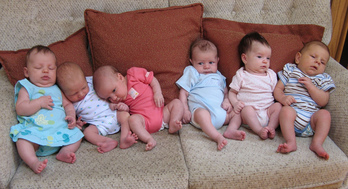
“They are,” he says, “not selling science. They are selling a theological belief.”
His words have a touch of irony to them,
| | considering overpopulation adherents have believed themselves on the side of science since Thomas Malthus wrote “An essay on the principles of population” in 1798. Never mind that his predictions of starvation and disease as a result of population growth have been thoroughly discredited by world history since then. Today’s believers hold to articles of faith concerning things like the earth’s carrying capacity. “Carrying capacity?” Last says. “Certainly, earth must have one, but there is no good research on this.” True believers apparently don’t need it. I spoke with Last on the day his book, “What to expect when no one’s expecting,” was released. It was only a few days after his equally provocative essay, “America’s baby bust,” was published by the Wall Street Journal. Last, a senior writer at the Weekly Standard, believes the real crisis America faces is not its national debt or any looming fiscal crisis. Instead, it is its fertility rate, or lack thereof. Today, that rate is 1.93. The replacement rate is 2.1. Unless we make more babies, the nation is in for a world of trouble. Our interview dovetailed nicely with Eric Schulzke’s recent report in the Deseret News, titled, “Studies show social cost of fewer families.” It examined how a rapid shift away from traditional families among young Americans (more than 50 percent of adults today are single, compared with 22 percent in 1950) will affect the future. Some places in the world already face this crisis. In shrinking Singapore, the report noted, the government is offering cash premiums for children, with greater amounts going to those with multiple kids. The United States is, of course, not shrinking. Last says we can thank immigration for that, but we can’t count on it for long. Birthrates are falling south of the border. “Mexico is right at replacement level,” he said, and it is falling. All the arguing over immigration reform in Congress may be over a problem that soon won’t exist. The entire world is voluntarily going infertile. Demographers, Last said, believe world population will peak in about 60 to 70 years, then begin to decline. The result will be a population that skews toward the elderly, without enough young workers to support them. Last uses data to argue that population growth leads to innovation, invention and conservation. He echoes a report I wrote about long ago, titled, “It’s getting better all the time,” that enumerates the many ways in which life has improved over the last century alone. Commodity prices have come down, diseases have been cured, and water and air have become cleaner. Without an expanding population, the next century won’t see such gains, and things likely will get worse. Only when our conversation turns to a solution does Last become uncertain. Neither liberals nor conservatives have one, he said. The only hope is a “changing of the culture.” Religion holds a big key. Last cites statistics showing a correlation between regular church attendance and large families. Regardless of denomination, he said, most religions teach “there are things more important than you are.” To have children, especially many of them, you have to buy into the idea that there is a benefit to sacrificing your own desires and gratification. He is impressed with how Brigham Young University provides married student housing. States, he said, should offer this at more universities, at least allowing the option of being married with children while doing undergraduate work. Beyond that, government could be more welcoming of religion in the public square and could find ways to break up the “college cartel” that has led to skyrocketing tuition costs, which discourage young people from assuming the added cost of children. Already, pundits have assailed Last for attacking Malthus and his doctrine. Few I’ve seen so far have confronted his data directly. Perhaps they worry it would shake their theology. |

 RSS Feed
RSS Feed

